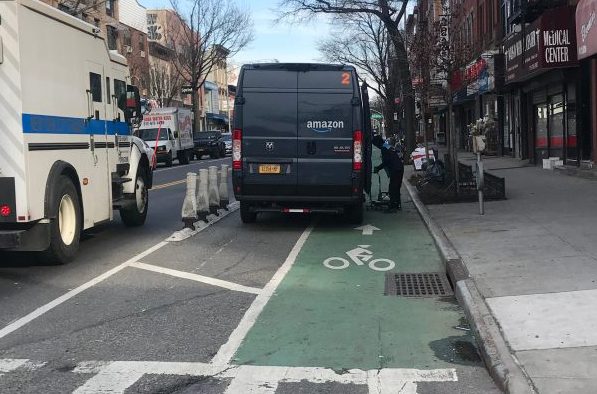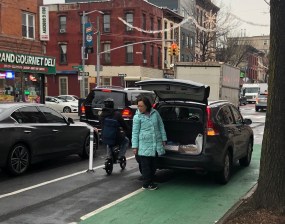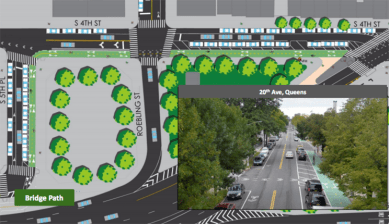DOT’s New Protected Grand Street Bike Lane Is Still Not Protected

It’s still no grand Grand Street!
Bikers are still forced to swerve into traffic thanks to cars and trucks continuously parked in what’s supposed to be a new-and-improved protected bike lane along one of North Brooklyn’s main corridors to the Williamsburg Bridge.
The Department of Transportation made long-overdue upgrades to the Grand Street bike lane in January, by installing thick delineators designed to keep truckers out of the green paint — but the job is now finished, and Grand Street is still a disaster, bikers and cycling advocates say.
“Checking in on the Grand Street bike lane this morning. As (police) and (DOT) continue to ignore the situation it gets more dangerous by the day. When I spoke with the truck driver he told me, ‘What are you going to do? We don’t care!’” said Eric Helms on Twitter on Feb. 4.
Checking in on the Grand Street bike lane this morning. As @NYPD90Pct and @NYC_DOT continue to ignore the situation it gets more dangerous by the day. When I spoke with the truck driver he told me “What are you going to do? We don’t care!” pic.twitter.com/L0g8HzXZxa
— Eric Helms (@EricPHelms) February 4, 2020
DOT installed the sturdier barriers along the south side of the bike lane between Morgan Avenue and Rodney Street after months of nearly daily complaints from cyclists who ride the crucial corridor — where three cyclists have been killed since 2016 — and after Streetsblog’s expose in August, revealing how the original floppy delineators did little to stop drivers from pulling into the bike lane.
And on Wednesday, Streetsblog set out again for another exhibition heading east down Grand Street. It wasn’t much better.
On Grand Street just before Leonard Street, two cyclists were forced out of the bike lane and into regular traffic because of a Frito Lay truck parked in it.

At one point, this reporter also had to leave the bike lane because of an Amazon truck taking up its whole width, and could not easily get back in until nearly halfway down the block.

Helms, a daily commuter, even started documenting the number of vehicles parked in the bike lane, and counted an average of at least 10 in each direction during his morning and evening rides home.
After a month of tracking my commute down the "protected" bike lane on Grand Street in #BikeNYC, I have a few findings:
– During the morning there were an average of 12 cars in the westbound bike lane.
– During the evening there were an average of 10 cars in the eastbound lane. https://t.co/559mBVhKJu— Eric Helms (@EricPHelms) January 31, 2020
The issue with the new protective barriers is that they are placed wide enough from the curb to allow trucks to travel their entire length through the bike lane — but DOT can’t move them any closer because the Department of Sanitation’s street sweepers must be able to pass through, and the agency doesn’t have any smaller trucks.
“The fact that is it’s an issue of Sanitation as well as DOT. We need a commitment from the mayor for actual Vision Zero,” said Philip Leff, a member of Transportation Alternatives. “The administration continues to make lines on a map and numbers on annual reports and feel good about itself, but they’re still not really taking the steps to treat this as a real transportation network. It involves a lot more than just dropping stuff in. It takes adjustments to buying smaller vehicles.
Bike New York’s Jon Orcutt penned an op-ed in the Daily News on Monday urging the city agencies to better coordinate, and invest in smaller trucks that would then allow DOT to make the bike lane wide enough for cyclists but narrow enough to keep trucks out.
“The bike lane is defined by fancy, heavy-duty protection, but is still full of trucks. All because DOT is forced to make bike lanes wide enough to accommodate Sanitation’s truck-sized street sweepers,” Orcutt said. “Transportation officials have quietly raised this issue with Sanitation officials for years, but Sanitation has never gotten off the dime to buy smaller street sweepers.”
Update: A Department of Sanitation spokeswoman said the agency is continuing to explore new equipment and methods of keeping streets clean in New York City’s changing streetscape, including smaller equipment for their operations.

